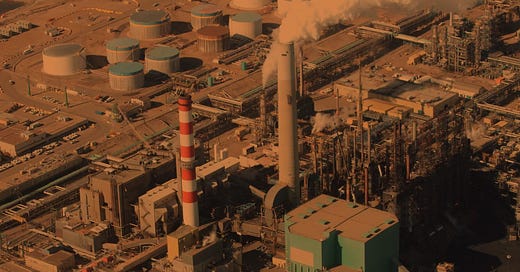Trump invited polluters to request exemptions to Clean Air Act rules. Is it legal?
The exemptions could trigger legal fights that test the president’s authority to make judgment calls about technology and national security.
(Editor’s note: Are you a federal employee who works on environmental or energy issues and want to talk about what’s happening? Landmark has the secure messaging service Signal. Send us a message.)
The Trump administration’s open invitation asking polluters to request exemptions from certain clean air regulations could trigger tests of President Donald Trump’s ability to shortcut a major environmental law, according to legal experts who spoke with Landmark.
The U.S. Environmental Protection Agency’s request gave polluters the ability to apply for an exemption to certain Clean Air Act (CAA) rules finalized during the Biden administration that broadly made it difficult to operate coal power plants, steel manufacturers and chemical plants.
The exemption relies on a provision of the CAA — Section 112(i)(4) — that says the president has the ability to exempt certain pollution sources like power plants from regulatory requirements if two prerequisites are met.
First, the technology needed to implement the regulation must not be available. And second, it must be within the national security interests of the U.S. to grant an exemption.
Legal experts told Landmark the extent of the president’s authority under the provision is largely untested. And eventual challenges will likely claim the individual exemptions are “arbitrary and capricious” in violation of the Administrative Procedure Act — a law that is typically designed to police agency actions and not the decisions of presidents themselves.
“The agency is doing the collection of these requests for exemptions, but the actual action would be a presidential one, and the Clean Air Act provides for presidential findings,” said Steven Feit, an attorney at the Center for International Environmental Law.
The legal approach would likely rest on that assumption: “You need to imagine this power living with an agency.”
Since it is somewhat unlikely that judges will question a president’s views on national security, experts say challenges would likely focus on whether the president reasonably concluded that technologies aren’t available.
A no-brainer for industry groups
The EPA’s invitation closed Monday evening, and is one of numerous policies that aim to make it easier to operate businesses and facilities that the Biden administration had cracked down on over climate change and public health concerns.
The EPA identified nine specific rules for which industry could seek exemptions. The rules require greater emissions reductions from coal power plants, and cracked down on hazardous air pollution from sterilization, rubber tire, copper, steel and iron ore processing facilities, among others.
Duane Morris special counsel Viviana Heger, who helps advise industry on environmental compliance issues, told Landmark that industry groups submitted numerous comments expressing their concerns that the rules were too strict and that the facilities couldn’t meet the requirements given available technology.
In some instances, there are clear national security questions raised by the exemption request, Heger said. For example, steel manufacturing is needed to build out energy and military capabilities. And in some cases there are only a “handful” of entities that are subject to the rules, including just 11 coke oven operations, eight iron and steel manufacturers, eight taconite manufacturers and just three primary copper smelting facilities, Heger said.
Since non-compliance can trigger costly enforcement, Heger said that “applying for the exemption provides no downside.”
Challenges on the horizon
Environmental group attorneys are watching the exemptions closely.
Jason Rylander, the legal director for the Center for Biological Diversity’s Climate Law Institute, told Landmark that the exemptions themselves aren’t unusual but “what’s unprecedented is the blanket request for stationary sources to request exemptions by email.”
Rylander, whose organization has submitted a Freedom of Information Act request seeking copies of the submissions the EPA receives, said that the rules have already been vetted for feasibility, and include detailed technical guidelines.
“I'm hard pressed to see how most regulated sources would meet the first criteria that the technology to implement the standard is not available,” Rylander said. “I think that's a fact issue that could be tested in court.”
But the national security element is of “even greater concern,” he continued.
Since the Trump administration has defined energy development as an issue of national security, and Trump has declared a national energy emergency, Rylander said “it’s frightening to think that they may just outright declare pollution to be in the national interest.”
“It is an open question how much discretion the president has to make that determination,” he said.
Feit, the Center for International Environmental Law attorney, emphasized that the exemptions don’t undo existing regulations. Polluters may be given a free pass for the next couple of years, but a new administration could come in and refuse to renew.
“The regulations will remain in force until and unless they’re changed by the regulatory process,” he said. “That means, right now, not only the EPA has the ability to enforce them but there are citizens provisions in a lot of environmental laws. There is a role for state agencies and state attorneys general.”
“Even if they may get some kind of path from the federal administration right now, that doesn’t mean that those obligations don’t exist and, so, there could be consequences and even potential liability down the line,” he continued.





